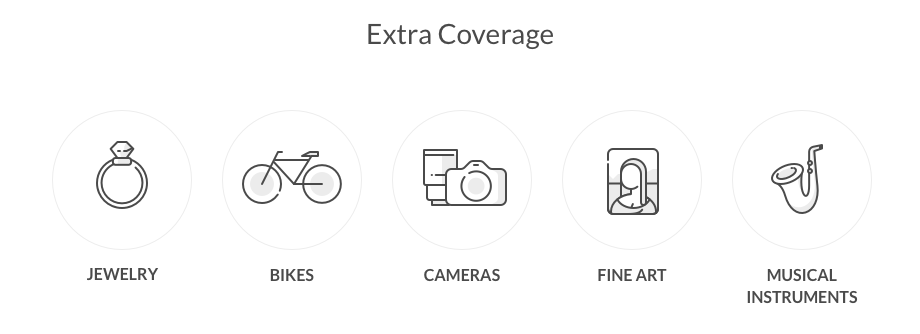Renters insurance isn’t the sexiest of topics. It’s that thing your parents always reminded you to get in case something happened in your apartment. You might have ignored them—and then kicked yourself years later after your stuff was stolen or damaged.
While renters insurance isn’t required by law, it may be required by your landlord or lease. In any case, with rates as low as $5/month, it’s a small, sensible investment to protect you from unexpected financial loss or out-of-pocket expenses.
How to get renters insurance, and what it includes
The good news is that signing up for a policy is often quite simple. Depending on the insurer, you can get a renters insurance quote in minutes. Your Lemonade policy would be effective as soon as 12:01am on the following day.
Here’s where to start:
1. Familiarize yourself with the basics
When you sign up for a renters insurance policy, you’ll be able to set the deductible you’ll be responsible for, and the coverage limits you’d like.
You’re able to set different limits for things like personal property coverage or personal liability. That means the maximum amount your insurance company would compensate you, per policy term, for all covered claims.
Your deductible is the amount you’d be responsible for—say, $500, or $1,000—before your insurer would compensate you for a covered claim. Choosing a higher deductible, and lower coverage limits might make your monthly premium cheaper. But they may mean you end up paying more later, in the event of a claim.
2. Figure out what your stuff is worth

This can seem like a daunting task, but it doesn’t need to be. And determining the value of your belongings isn’t an exact science. Spend a bit of time going from room to room in your rental, and make an itemized list of what you own and around how much it costs.
Consider everything from your wardrobe to computers, stereos, kitchen appliances that aren’t owned by the landlord, furniture, and anything else that belongs to you.
If you come to the conclusion that you’ve got around $15,000 worth of stuff, you’d want to round up and choose personal property coverage of $20,000.
3. Earmark any personal belongings that might be worth adding additional coverage for
When signing up for a renters insurance policy, you’ll have the option to “schedule” certain personal property—things like jewelry, bicycles, artwork, cameras, or musical instruments (provided that these items aren’t used professionally).

While these things are all covered by your basic policy to some degree, “scheduling” them will help ensure you can recover more of their value in the event of a covered claim. (For instance, under your basic policy, some of these items may have a sublimit for theft of $1,500.)
You find out more about scheduling personal property here.
4. Consider your exposure for personal liability claims
You’ll also be choosing coverage limits for personal liability and medical bills coverage. Think about how often you do things like host parties or large social gatherings—events where a guest could potentially be injured on your property.
If you’re in the habit of hosting Superbowl shindigs, rowdy book clubs, or game nights featuring vigorous Charades or Twister, you might want to consider higher coverage limits.
5. Explore renters insurance companies
Lemonade isn’t the only game in town, and we want you to see all your options. Check out various companies, compare the coverages they offer, and decide what feels best.
Don’t just look at prices, either—make sure you’re investigating the specific coverages and deductible options offered, as well as what’s included (and excluded). Comparison sites can help here, as well as checking out the customer ratings of various insurer’s apps.
6. Determine if bundling is right for you

If you purchase a second policy—like Lemonade’s car, pet, or life insurance—you maybe eligible for bundle discounts. Plus you’ll be able to use a single app to access and file claims for all of your policies.
7. Get a quote!
Depending on the insurer, this might involve a digital quote process—applying online. Applying for a renters insurance policy with Lemonade doesn’t require much—just your address!
When you go through the digital quote process, we’ll ask you basic questions, and let you set the deductible amount and coverage limits. You’ll be able to note any valuables you’d like to “schedule,” as we mentioned above.
In most cases, you’ll receive your renters insurance quote instantly, or the same day. With Lemonade Renters, your policy could then become effective as early as 12:01am of the following day.
More renters insurance FAQs
To recap, here are a few common questions.
How much time does it take to get a renters insurance quote?
With many providers, you’ll be able to fill out an online form and get your quote back fairly quickly. If you’re getting a quote from Lemonade, the process is 100% digital—you can apply on your phone—and you’ll generally receive your price in minutes.
Is renters insurance effective immediately?
At Lemonade, you’ll be able to set your policy’s effective start date as soon as 12:01 on the day after you purchase the policy.
Can you change coverage limits after you’ve signed up for a policy?
Yes, you’ll be able to raise or lower your coverage limits, as well as your deductible, at any point—though doing so will affect your monthly premium price. Also, you can “schedule” individual items at a later date, like if you buy an expensive piece of jewelry or a new SLR camera.
Does your renters insurance policy cover your roommates?
No. Your renters insurance policy only covers you and your stuff (unless you’re living with someone who is related by blood or marriage). That means you should nudge your roomies to get their own personal policies, just in case.
Does your renters insurance policy cover family members or spouses?
Yes, your renters insurance policy can cover spouses and immediate family members, you’ll just need to add them through the Lemonade app, at no additional charge. You can also add significant others you’re not married to as “additional insureds,” but that will affect your premium price.
What’s not covered by renters insurance?
The physical structure of your apartment or home isn’t covered by your policy—that falls under your landlord’s insurance policy. Ditto any appliances, furniture, or fixtures owned by the landlord.
Also, your personal liability coverage only applies to guests or visitors to your home. It won’t kick in if you get injured at your own house. But it will apply if you accidentally cause damage at a friend’s place—say, if you trip and manage to smash a fancy glass coffee table.
More on what renters insurance covers and doesn’t cover here.
What are some other common things that renters insurance does cover?
Your renters policy may cover damages to your personal belongings caused by things like vandalism, fire, windstorms, certain types of water damage, theft, and more. It will generally not cover damages related to floods or earthquakes.
Renters insurance also includes personal liability and medical expenses coverage, which would kick in if a guest to your home were to be injured on the property, or if you were to accidentally cause covered damage at someone else’s place.
A few quick words, because we <3 our lawyers: This post is general in nature, and any statement in it doesn’t alter the terms, conditions, exclusions, or limitations of policies issued by Lemonade, which differ according to your state of residence. You’re encouraged to discuss your specific circumstances with your own professional advisors. The purpose of this post is merely to provide you with info and insights you can use to make such discussions more productive! Naturally, all comments by, or references to, third parties represent their own views, and Lemonade assumes no responsibility for them. Coverage may not be available in all states.




